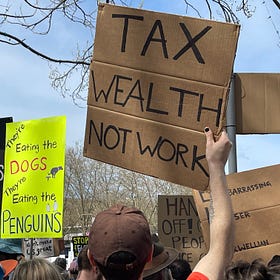Why NGOs have been tax exempt since America first taxed income
The answer has more to do with economics than politics or charity.
President Donald Trump has focused some of his attention on cutting funding and tax exempt status from nonprofit organizations. While it’s clear he is doing so because he doesn’t agree with their charitable aims, the president is also showing he does not understand why previous government leaders thought it was incredibly smart to make sure these organizations thrive.
Since that history also was relatively unknown to me until I started researching this essay, I’m guessing it will be news to many of you as well.
Before the United States even had an income tax, the country had a healthy charitable sector – community groups that helped their neighbors with everything from healthcare to food to education. Today, we sometimes call these small, grassroots efforts “mutual aid.” They were the lifeblood of communities in colonial and pioneer times. If you don’t have a grandparent around to tell you about American life in the “olden days,” watch or read Little House on the Prairie. Seriously.

While the U.S. briefly levied a flat income tax to finance the Civil War, the modern tax system wasn’t born until 1913, when Congress ratified the 16th Amendment to the U.S. Constitution. Charitable organizations were specifically exempted from this tax because they were essential to American life – and effectively saved the government money and effort.
But according to the IRS’s history of taxation, special status for charitable groups dates back further to the Tariff Act of 1894, the first law to mention a special status for some organizations.
Yet conservatives talk of nonprofits as groups taking advantage of the system, providing them generous government subsidies.
White House spokesperson Harrison Fields said in a recent statement, according to Politico, “Non profits have been running wild off of the drunken unchecked spending of the federal government and that stopped on Jan 20. We are no longer going to support organizations that stand in stark contrast to the mission of the president of the United States.”
The reality is just the opposite. The government takes advantage of nonprofits to support the most vulnerable in our society because these nongovernmental organizations (NGOs) are more efficient and can accomplish more than a government agency with the same amount of cash to spend.
Why is this true? Volunteers and donors! Nonprofit organizations get more done because people donate both their time and their treasure to help them accomplish their goals. While nonprofits save some money on taxes and can get some government grants, they also use resources other than tax dollars to complete the work that would otherwise fall on the government to do.

The Philanthropy Roundtable explains that research has shown charities consistently get more for their money than government agencies. One 2005 study in the Journal of Public Policy and Marketing found that, for every tax dollar the government does not collect from a nonprofit another $1.44 in charitable donations is added. The charitable tax exemption is a very good investment on behalf of the American taxpayer.
Tax laws and the history behind them make it clear that another intent of this separate system is to protect it from political involvement and overreach. This gets to the heart of why Trump and his friends do not like the charitable tax exemption: Some of the money goes to organizations with goals the administration does not support.
Protecting nonprofits from political interference is apparently not a goal of the Trump administration, which has done a lot lately to interfere with the nonprofit sector and has announced plans to do even more. In addition to cutting grants from agencies like USAID and Americorps, the federal government has stopped $500 million in deliveries to food banks, they’re debating eliminating the public-private preschool program Head Start and are battling universities by threatening to revoke their non-profit status.
In February, Trump ordered a review of federal government support to nongovernmental organizations. Because of the wording of the two-paragraph memo, First Amendment organizations raised a red flag, according to The Chronicle of Philanthropy.
The order stated many NGOs “are engaged in actions that actively undermine the security, prosperity, and safety of the American people. It is the policy of my Administration to stop funding NGOs that undermine the national interest.”
IRS regulations are relatively simple. Only the following activities can jeopardize an organizations’ nonprofit status: Insider benefit, substantial lobbying, political campaigning, unrelated business income, failure to report their income and spending, doing something other than their stated charitable purpose. The rules are spelled out in more detail in this IRS publication.
In January, Trump took aim at charitable foundations, which follow similar IRS rules. And next up, apparently are nonprofits that focus on the environment, just in time for Earth Day, according to Bloomberg.
The charitable deduction was added to federal tax laws around World War I because government officials were concerned that the tax increase needed to fund the war would decrease the amount of money going to charity and the government needed those charitable organizations to keep doing what they were doing.
According to a history of nonprofits from the Philanthropy Roundtable, another advantage charities have is their place in the community, closer than government agencies to the people they want to help and the issues they can tackle. They use the pandemic as a good example of how this works.
U.S. charitable giving rose dramatically in 2020 and those donations were concentrated in regions hardest hit by COVID-19. A study found charitable giving increased in 78% of the U.S. counties that saw the biggest pandemic impact and that influx of cash flowed to charities offering direct help to people.
People know this in their hearts and their heads: Charities are more efficient at spending their money than the government. They have to be in order to retain public trust and keep getting more donations to do the work. And many would survive without any influx of government dollars, but, yet again, the ones that would be hurt the most by Trump’s plans would be the small organizations in small towns and rural areas, the counties that voted for the Republican president.
Go Deeper: keep reading
National Council of Nonprofits guide to Trump executive orders: https://www.councilofnonprofits.org/impacts-recent-executive-orders-nonprofits
Table of Contents [Start Here]
Welcome to the wayback machine for Civics for Adults. Start here if you’re new to this newsletter and want to get caught up, or if you want to find a post you think you read here before.
How to be a professional truth teller
Democracy is a participatory sport. And so is journalism these days. That means we all have a responsibility to not contribute to disinformation online.
Are NPR, PBS and Elmo in trouble?
U.S. taxpayer support for public broadcasting – NPR and PBS – could be about to end, if President Donald Trump and some Republicans in Congress get their wish.



![Table of Contents [Start Here]](https://images.unsplash.com/photo-1532294220147-279399e4e00f?crop=entropy&cs=tinysrgb&fit=max&fm=jpg&ixid=M3wzMDAzMzh8MHwxfHNlYXJjaHwxN3x8cGVyc29uJTIwd2l0aCUyMG9wZW4lMjBib29rfGVufDB8fHx8MTc0NDkyNzk5NXww&ixlib=rb-4.0.3&q=80&w=1080)

